#Black Musical Theater Writers
Text
hear me out:
Fanfics with specific interests/jobs that you can tell the author has a great deal of knowledge of.
Like Teacher AUs and Doctor AUs are great and dandy and I'll eat them up every time. But like...
Where are my Cavern Tour Guide AUs and my UIL One Act Play AUs? I'm planning on writing some myself. But just know that if you have a niche interest or a specific job you have lots of knowledge in, it could make a really cool plotline.
As a theatre kid who works at a cavern tourist attraction, I would be able to put SO much detail and info into these stories, which I think would make it so much fun. Would people be interested in them?? I dunno.
But like Jegulus as Tour Guides for the same caverns would be so cute.
#maurauders era#jegulus#fanfic#marauders#mauraders#regulus black#regulus x james#sunseeker#tour guide#musical theater#ao3 fanfic#fanfiction#ao3#archive of our own#ao3 writer
28 notes
·
View notes
Text
free online james baldwin stories, essays, videos, and other resources
**edit
James baldwin online archive with his articles and photo archives.
---NOVELS---
Giovanni's room"When David meets the sensual Giovanni in a bohemian bar, he is swept into a passionate love affair. But his girlfriend's return to Paris destroys everything. Unable to admit to the truth, David pretends the liaison never happened - while Giovanni's life descends into tragedy. This book introduces love's fascinating possibilities and extremities."
Go Tell It On The Mountain"(...)Baldwin's first major work, a semi-autobiographical novel that has established itself as an American classic. With lyrical precision, psychological directness, resonating symbolic power, and a rage that is at once unrelenting and compassionate, Baldwin chronicles a fourteen-year-old boy's discovery of the terms of his identity as the stepson of the minister of a storefront Pentecostal church in Harlem one Saturday in March of 1935. Baldwin's rendering of his protagonist's spiritual, sexual, and moral struggle of self-invention opened new possibilities in the American language and in the way Americans understand themselves."
+bonus: film adaptation on youtube. (if you’re a giancarlo esposito fan, you’ll be delighted to see him in an early preacher role)
Another Country and Going to Meet the Man Another country: "James Baldwin's masterly story of desire, hatred and violence opens with the unforgettable character of Rufus Scott, a scavenging Harlem jazz musician adrift in New York. Self-destructive, bad and brilliant, he draws us into a Bohemian underworld pulsing with heat, music and sex, where desperate and dangerous characters betray, love and test each other to the limit." Going to meet the Man: " collection of eight short stories by American writer James Baldwin. The book, dedicated "for Beauford Delaney", covers many topics related to anti-Black racism in American society, as well as African-American–Jewish relations, childhood, the creative process, criminal justice, drug addiction, family relationships, jazz, lynching, sexuality, and white supremacy."
Just Above My Head"Here, in a monumental saga of love and rage, Baldwin goes back to Harlem, to the church of his groundbreaking novel Go Tell It on the Mountain, to the homosexual passion of Giovanni's Room, and to the political fire that enflames his nonfiction work. Here, too, the story of gospel singer Arthur Hall and his family becomes both a journey into another country of the soul and senses--and a living contemporary history of black struggle in this land."
If Beale Street Could Talk"Told through the eyes of Tish, a nineteen-year-old girl, in love with Fonny, a young sculptor who is the father of her child, Baldwin's story mixes the sweet and the sad. Tish and Fonny have pledged to get married, but Fonny is falsely accused of a terrible crime and imprisoned. Their families set out to clear his name, and as they face an uncertain future, the young lovers experience a kaleidoscope of emotions-affection, despair, and hope. In a love story that evokes the blues, where passion and sadness are inevitably intertwined, Baldwin has created two characters so alive and profoundly realized that they are unforgettably ingrained in the American psyche."
also has a film adaptation by moonlight's barry jenkins
Tell Me How Long the Train's been gone At the height of his theatrical career, the actor Leo Proudhammer is nearly felled by a heart attack. As he hovers between life and death, Baldwin shows the choices that have made him enviably famous and terrifyingly vulnerable. For between Leo's childhood on the streets of Harlem and his arrival into the intoxicating world of the theater lies a wilderness of desire and loss, shame and rage. An adored older brother vanishes into prison. There are love affairs with a white woman and a younger black man, each of whom will make irresistible claims on Leo's loyalty.
---ESSAYS---
Baldwin essay collection. Including most famously: notes of a native son, nobody knows my name, the fire next time, no name in the street, the devil finds work- baldwin on film
--DOCUMENTARIES--
Take this hammer, a tour of san Francisco.
Meeting the man
--DEBATES:--
Debate with Malcolm x, 1963 ( on integration, the nation of islam, and other topics. )
Debate with William Buckley, 1965. ( historic debate in america. )
Heavily moderated debate with Malcolm x, Charles Eric Lincoln, and Samuel Schyle 1961. (Primarily Malcolm X's debate on behalf of the nation of islam, with Baldwin giving occassional inputs.)
----
apart from themes obvious in the book's descriptions, a general heads up for themes of incest and sexual assault throughout his works.
#james baldwin#motivated by i think people here think it's harder to find resources and read than it actually is. so much stuff online!#motivation nr 2 wtf
11K notes
·
View notes
Text
Historian Henry Louis Gates, Jr., has called the Harlem Renaissance "As gay as it was Black."
With the convergence of the great migration and the jazz age, Harlem became a new center of cultural life for African-Americans. It brought together Black artists in a way that had never been seen before and saw an abundance of new music, theater literature, and art.

Chief among the new art being created there, of course, was drag.

While drag houses and drag balls had previously been put together by the likes of William Dorsey Swann, they reached a level of unprecedented vibrancy and popularity in Harlem in the 1920s. Famed poet Langston Hughes called them "The strangest and gaudiest of all of Harlem's spectacles."
The most celebrated of these balls was the one organized by the fraternal organization The Society of Odd Fellows at the Hamilton Lodge.
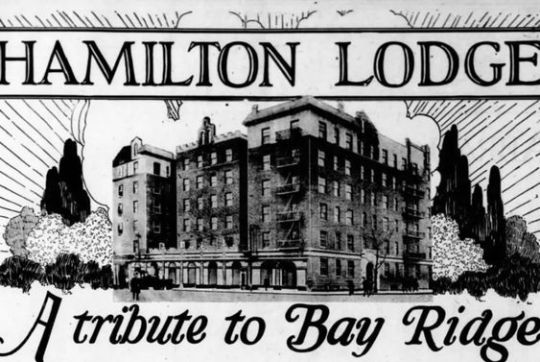
As told by writer George Chauncey in an article for Columbia News, "After I published Gay New York I met a gentleman who grew up in Harlem whose parents would dress up to go to what they called the “faggots’ ball,” and come home and talk about how fine this one looked, and how wonderful it was. He said, "My mother was a very ladylike lady. She was a very prominent woman in Harlem society. This is just something you did.""
735 notes
·
View notes
Text

Meet the Artist: @jovaline
Hi, my name is Arielle, and I’m a Filipina-American freelance illustrator, comic book artist, and writer! As a long-time theater kid, I love drawing characters with emotionally specific facial expressions and body language, and designing fun outfits and sets for them to live in. I take a lot of inspiration from vintage illustrations, fashion, musicals, and books. You might know my work from my graphic novels Black Star, Evil Thing: A Villains Graphic Novel, or most recently Girl Taking Over: A Lois Lane Story. It’s equally possible you’ve seen my work floating around here on Tumblr because I’ve been on this platform for 12 years!! Thanks so much for taking a look~ :)
Pleased to meet you, Arielle! Below is some of her work that she has picked out for you all to appreciate.


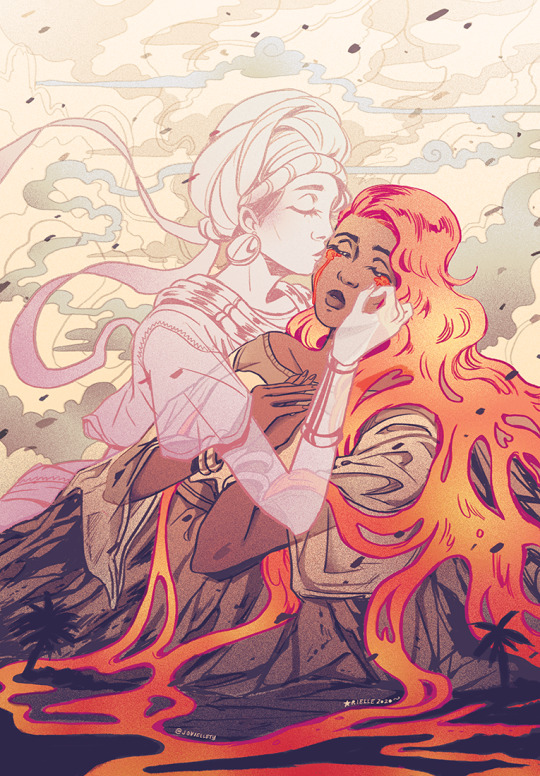
For more of Arielle’s work, be sure to check out her Tumblr, @jovaline!
-
We are highlighting some of Tumblr’s talented artists of Asian descent all month as part of Asian American and Pacific Islander Heritage Month!
#meet the artist#meet the artist on tumblr#artists on tumblr#art#six the musical#atla#asian artists#aapi month#apahm
2K notes
·
View notes
Text

FATHER & SON: James Earl Jones with his Father Robert Earl Jones on Stage in the 1962 Production "Moon on a Rainbow Shawl."
Robert Earl Jones (February 3, 1910 – September 7, 2006), sometimes credited as Earl Jones, was an American actor and professional boxer. One of the first prominent Black film stars, Jones was a living link with the Harlem Renaissance of the 1920s and 1930s, having worked with Langston Hughes early in his career.
Jones was best known for his leading roles in films such as Lying Lips (1939) and later in his career for supporting roles in films such as The Sting (1973), Trading Places (1983), The Cotton Club (1984), and Witness (1985).
Jones was born in northwestern Mississippi; the specific location is unclear as some sources indicate Senatobia, while others suggest nearby Coldwater. He left school at an early age to work as a sharecropper to help his family. He later became a prizefighter. Under the name "Battling Bill Stovall", he was a sparring partner of Joe Louis.
Jones became interested in theater after he moved to Chicago, as one of the thousands leaving the South in the Great Migration. He moved on to New York by the 1930s. He worked with young people in the Works Progress Administration, the largest New Deal agency, through which he met Langston Hughes, a young poet and playwright. Hughes cast him in his 1938 play, Don't You Want to Be Free?.
Jones also entered the film business, appearing in more than twenty films. His film career started with the leading role of a detective in the 1939 race film Lying Lips, written and directed by Oscar Micheaux, and Jones made his next screen appearance in Micheaux's The Notorious Elinor Lee (1940). Jones acted mostly in crime movies and dramas after that, with such highlights as Wild River (1960) and One Potato, Two Potato (1964). In the Oscar-winning 1973 film The Sting, he played Luther Coleman, an aging grifter whose con is requited with murder leading to the eponymous "sting". In the later 20th century, Jones appeared in several other noted films: Trading Places (1983) and Witness (1985).
Toward the end of his life, Jones was noted for his stage portrayal of Creon in The Gospel at Colonus (1988), a black musical version of the Oedipus legend. He also appeared in episodes of the long-running TV shows Lou Grant and Kojak. One of his last stage roles was in a 1991 Broadway production of Mule Bone by Hughes and Zora Neale Hurston, another important writer of the Harlem Renaissance. His last film was Rain Without Thunder (1993).
Although blacklisted by the House Un-American Activities Committee in the 1950s due to involvement with leftist groups, Jones was ultimately honored with a lifetime achievement award by the U.S. National Black Theatre Festival.
Jones was married three times. As a young man, he married Ruth Connolly (died 1986) in 1929; they had a son, James Earl Jones. Jones and Connolly separated before James was born in 1931, and the couple divorced in 1933. Jones did not come to know his son until the mid-1950s. He adopted a second son, Matthew Earl Jones. Jones died on September 7, 2006, in Englewood, New Jersey, from natural causes at age 96.
THEATRE
1945 The Hasty Heart (Blossom) Hudson Theatre, Broadway
1945 Strange Fruit (Henry) McIntosh NY theater production
1948 Volpone (Commendatori) City Center
1948 Set My People Free (Ned Bennett) Hudson Theatre, Broadway
1949 Caesar and Cleopatra (Nubian Slave) National Theatre, Broadway
1952 Fancy Meeting You Again (Second Nubian) Royale Theatre, Broadway
1956 Mister Johnson (Moma) Martin Beck Theater, Broadway
1962 Infidel Caesar (Soldier) Music Box Theater, Broadway
1962 The Moon Besieged (Shields Green) Lyceum Theatre, Broadway
1962 Moon on a Rainbow Shawl (Charlie Adams) East 11th Street Theatre, New York
1968 More Stately Mansions (Cato) Broadhurst Theatre, Broadway
1975 All God's Chillun Got Wings (Street Person) Circle in the Square Theatre, Broadway
1975 Death of a Salesman (Charley)
1977 Unexpected Guests (Man) Little Theatre, Broadway
1988 The Gospel at Colonus (Creon) Lunt-Fontanne Theatre, Broadway
1991 Mule Bone (Willie Lewis) Ethel Barrymore Theatre, Broadway
FILMS
1939 Lying Lips (Detective Wenzer )
1940 The Notorious Elinor Lee (Benny Blue)
1959 Odds Against Tomorrow (Club Employee uncredited)
1960 Wild River (Sam Johnson uncredited)
1960 The Secret of the Purple Reef (Tobias)
1964 Terror in the City (Farmer)
1964 One Potato, Two Potato (William Richards)
1968 Hang 'Em High
1971 Mississippi Summer (Performer)
1973 The Sting (Luther Coleman)
1974 Cockfighter (Buford)
1977 Proof of the Man (Wilshire Hayward )
1982 Cold River (The Trapper)
1983 Trading Places (Attendant)
1983 Sleepaway Camp (Ben)
1984 The Cotton Club (Stage Door Joe)
1984 Billions for Boris (Grandaddy)
1985 Witness (Custodian)
1988 Starlight: A Musical Movie (Joe)
1990 Maniac Cop 2 (Harry)
1993 Rain Without Thunder (Old Lawyer)
TELEVISION
1964 The Defenders (Joe Dean) Episode: The Brother Killers
1976 Kojak (Judge) Episode: Where to Go if you Have Nowhere to Go?
1977 The Displaced Person (Astor) Television movie
1978 Lou Grant (Earl Humphrey) Episode: Renewal
1979 Jennifer's Journey (Reuven )Television movie
1980 Oye Ollie (Performer) Television series
1981 The Sophisticated Gents (Big Ralph Joplin) 3 episodes
1982 One Life to Live
1985 Great Performances (Creon) Episode: The Gospel at Colonus
1990 True Blue (Performer) Episode: Blue Monday
#james earl jones#black tumblr#black literature#black community#black excellence#blackexcellence365#actor#robert earl jones#stage actor
321 notes
·
View notes
Text


Propaganda
Josephine Baker (The Siren of the Tropics, ZouZou)— Josephine Baker was an American born actress, singer, and utter icon of the period, creating the 1920s banana skirt look. She was the first black woman to star in a major motion film. She fought in the French resistance in WWII, given a Legion of Honour, as well as refusing to perform in segregated theatres in the US. She was bisexual, a fighter, and overall an absolutely incredible woman as well as being extremely attractive.
Joan Crawford (Dancing Lady, Mildred Pierce, The Women)— God, where do I start!!! Her face is so UNIQUE and compelling and stands out so much. I love her thick brows and high cheekbones. She has a school-marmy hardness too her that makes her a little scary and therefore sexy. Her low thick voice also does it for me. Despite being an unusual looking woman with an unusual face, she never loses her glamour. Just a gorgeous talented actress, AND she was some sort of gay!!!
This is round 5 of the tournament. All other polls in this bracket can be found here. Please reblog with further support of your beloved hot sexy vintage woman.
[additional propaganda submitted under the cut. the famous banana skirt is mildly NSFW.]
Josephine Baker:
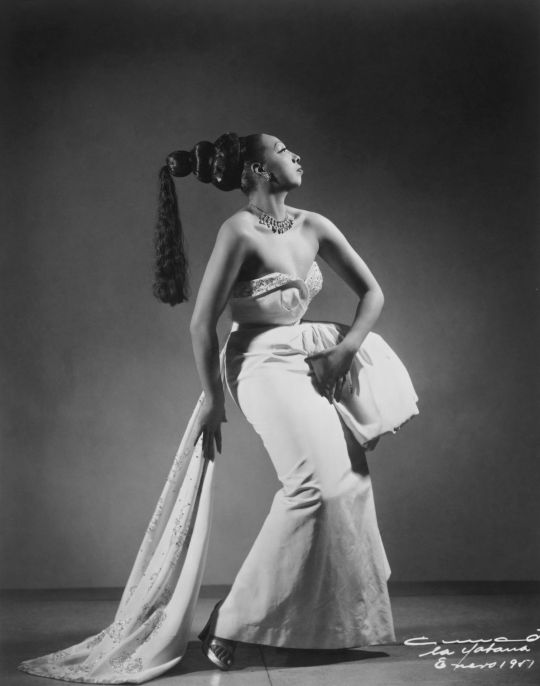
Black, American-born, French dancer and singer. Phenomenal sensation, took music-halls by storm. Famous in the silent film era.
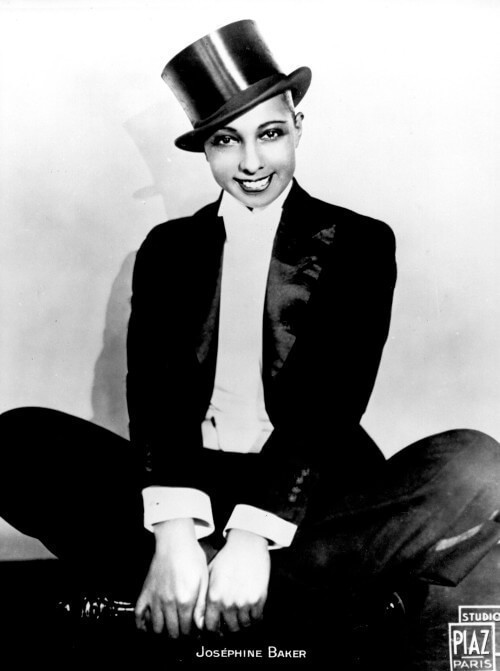
Let's talk La Revue Negre, Shuffle Along. The iconique banana outfit? But also getting a Croix de Guerre and full military honors at burial in Paris due to working with the Resistance.
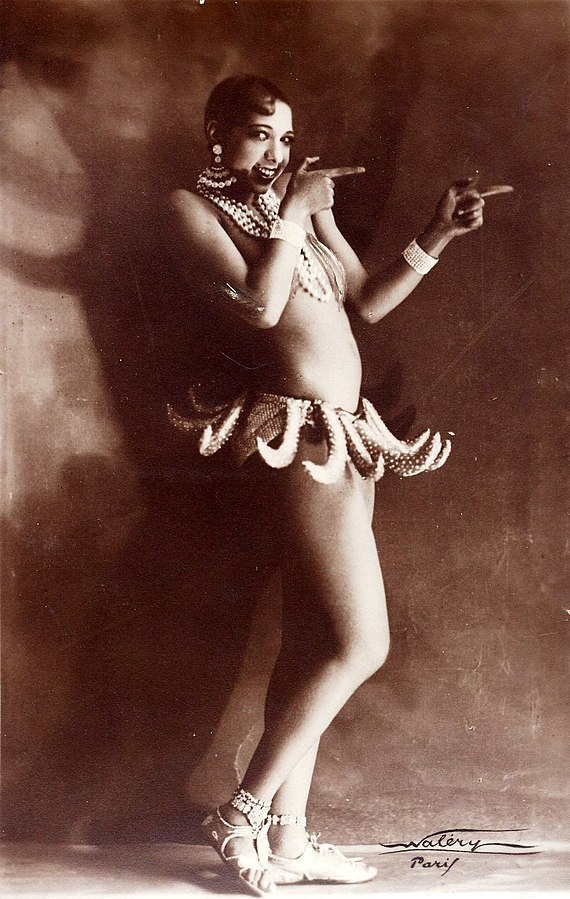
She exuded sex, was a beautiful dancer, vivacious, and her silliness and humor added to her attractiveness. She looked just as good in drag too.



So I know she was more famous for other stuff than movies and her movies weren’t Hollywood but my first exposure to her was in her films so I’ve always thought of her as a film actress first and foremost. Also she was the first black woman to star in a major motion picture so I think that warrants an entry
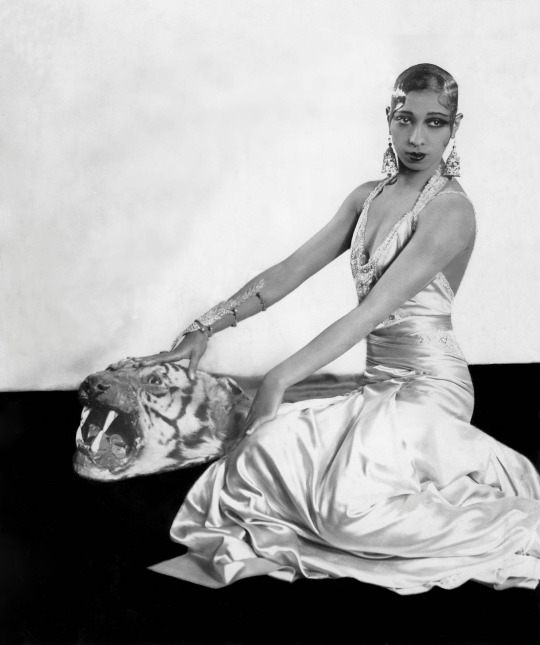
Iconic! Just look up anything about her life. She was a fascinating woman.
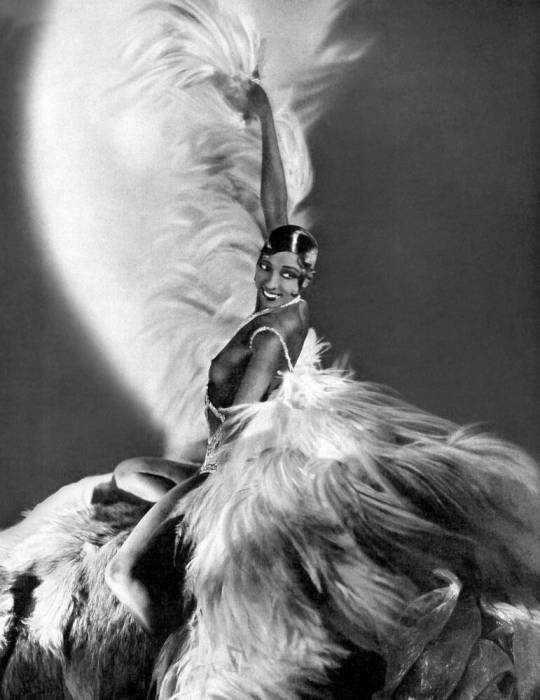
Joan Crawford:

I just love women that are very mean.

she was a smoke show in every decade, from the 20s to the 60s.
The classic matronly beauty with amazing eyebrows

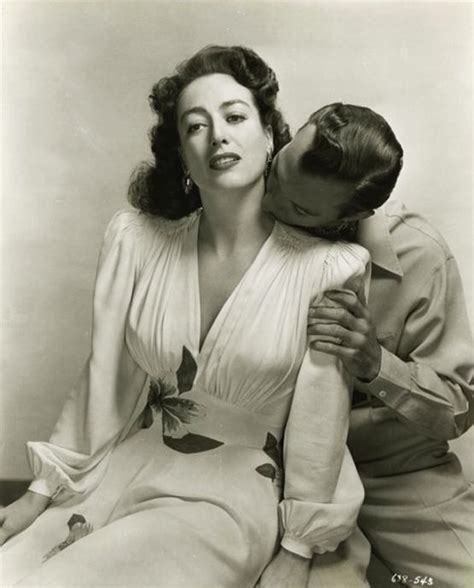
of course there's a space for MILF joan but i want to just take a second and say she was so cute in her early movies (like grand hotel and the women)! those parts often get forgotten but her stardom shines in them just as much as in her older #queen #icon roles

Misremembered for wire hanger hatred, this original screen queen mastered the art of the comeback and refused to let Hollywood toss her aside as she aged. The term “auteur” is usually revered for directors or writer-directors, but most critics have one actor they’ll give that title to as well: Crawford—anyone who knows classic movies already has a “Crawford picture” in their head. She knew how to style herself and promote herself. She made herself a star and kept herself fixated in the Hollywood firmament. What’s hotter than knowing just how hot you are?
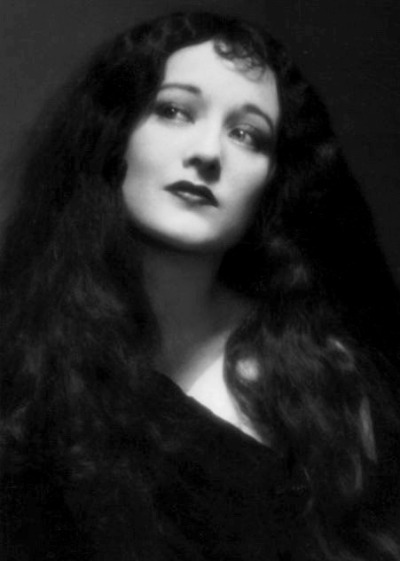

(don’t think about Mommie Dearest right now) Joan was known for being super nice to all the like crew of the movies she worked on and she’d get everyone gifts. Joan would hold movie nights at her house and knit at the back of her home theater. Joan was sooo obsessed with other women including Greta Garbo, whos dressing room she would obsessively and purposefully walk by. She said that while working on Grand Hotel, Garbo grabbed her face and “if there ever was a time in my life where I would’ve been a lesbian, that was it.” But like Joan also probably did sleep with women including Barbara Stanwyck. Joan was so obsessed with Bette Davis, screening multiple movies of hers in a day at her watch party, constantly trying to spend time with her or do a movie together, insisting on the dressing room next to hers at Warners and sending her daily gifts… etc. Once Bette said that sex was gods joke to humanity and Joan said “I think the joke is on her.” Joan fucked a lot. Joan got caught publicly fucking a man and sent a letter to the woman who saw them basically saying “I bet it excited you” and the woman was like you know what. It did. Joan was best friends with a gay man. Joan was an actually genuinely good actress even though people mocked her a lot for being like cheap and stupid (partially because she never finished school because her family was broke). Joan was so insane and so cool that’s all.

215 notes
·
View notes
Note
The rapresentation of abusers in helluva boss is something that particularly frustrates me, Stella in particular, it seems to be done just to victimaze certain characters not to show the complex dynamics of those relationships. It seems to me the writers aren't mature enough to handle these topics properly.
Abuse and Vivienne Medrano
Christmas 1962, a man renowned the western world over for his revolutionary approach to animation sat in a withering melancholy as he watched what could only be called a cinematic masterpiece based on a novel classic. Walt Disney, now in the twilight years of his life, saw the walls closing in and his legacy coming to a close. This man, who pioneered the animated feature film, saw his greatest accomplishment as his greatest obstacle. The man responsible for the tales brought to life of Cinderella, Snow White, Pinocchio, and Dumbo felt trapped in his achievement. “I wish,” Walt lamented, “I could make a picture like that.”
To Kill a Mockingbird was a piece that challenged its audience. The discussion of a white man defending a black man in southern America, years before the civil rights movement. The movement that, at the time the movie hit cinemas, was in its infancy. Released during the height of the historically revisionist counter movement taking place to combat the rising push of African Americans towards their human rights. The last film Walt Disney ever saw the production of before his death in 1966 was The Jungle Book, a movie that was the epitome of “Safe” and a message that upheld the status quo of segregation.
It wasn’t until 1972 that the media of animation became raucously adult with those political and challenging concepts Disney felt were unattainable. Fritz the Cat was an X-rated animated film composed of vignettes that were unapologetically perverse, violent, and aggressively political. Critical of politicians and the police with a sympathetic if exploitative lens towards the LGBT and racial minority communities Brooklyn-based director Ralph Bakshi grew up around. Bakshi proved that animation was not strictly a child-friendly media and that adult animation could be financially and critically successful.
(For more on Ralph Bakshi's career and animation history)
If one has ever had the opportunity to listen to a Brad Bird (director of Ratatouille and The Incredibles) interview, it is clear to see that the success of Bakshi was generally quite limited. That animation is considered a genre and not a medium of art has resulted in animated films being knee-capped in the box office. There is far more potential to animation, highlighted by Howard Ashton in his collaboration with Disney studios during the Renaissance. Responsible for resurrecting the feature-length animated movie through The Little Mermaid and credited for the monumental success of Best Picture Award winner Beauty and the Beast, Ashton once said that the potential animation was ideal for musical theatre. The limitless possibilities given the medium gave the possibility of introducing Broadway to the common folk who didn’t live in New York and otherwise couldn’t afford the theater. He was quoted saying that live action musical films were “an exercise in stupidity,” highlighting the freedom that comes with a blank page.
However, the success of animation, and media in general, comes down to the message the media wishes to send. The reason the Disney Renaissance films have enjoyed their position as cornerstones of pop culture and creativity was because it did introduce the artform of musical theater into homes and made them readily accessible to everyone with an even heightened sense of fantasy that revitalized Walt’s ethos of making films for the child in everyone.
With Bakshi, it was the loud and violently political message of a revolution taking place. This continues in adult animation with the Simpsons, a series critical of hyper-capitalist America and the fallout of Reagan’s economic disaster that the effects of which are still being felt today and a satire of toxic masculinity and abusive family dynamics.
So, ultimately, the value of a piece of media is a cross between its social artistic influence and the message the creators are intending to make. While Medrano’s influence on the field of indie animation is often mischaracterized as a “pioneer”, the fact is that indie animation and pilots have existed and been funded before Spindlehorse existed. It is simply that Medrano has had the spotlight handed to her for the myth surrounding the production and subsequent success of his indie projects. Artistically, her influence can be summarized as a double-edged sword. For some, she is the motivation for inspiring artists to connect with the community to one day, hopefully, create their own work. On the other hand, she is the cautionary tale of why investing in an indie project is a financial risk for an audience member and a risk to the community as a whole that poses a real danger of making the indie sphere financially cannibalistic, as her public persona is off-putting to “normies” and her show is simply not good.
Much like Disney, the man in 1962, and Disney the company circa 2023, the revolution of animating "because you can" loses its luster very quickly. Without something profound to say, an entire company, regardless of its social influence, can fade into irrelevance despite still being "successful". The story of Disney is a cautionary tale for Indie animation as a whole and Spindlehorse in specific.
And that is the other axis on this chart. Her narrative lacks a message worth telling, and that’s very much due to her not having anything worthwhile to say.
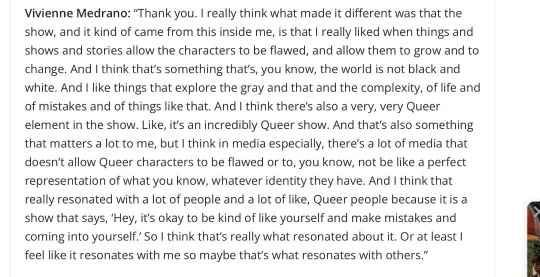
“I really liked when things and shows and stories allow the characters to be flawed, and allow them to grow and to change. And I think that’s something that’s, you know, the world is not black and white. And I like things that explore the gray and that and the complexity, of life and mistakes and of things like that.” - Vivienne Medrano
It is not for want of mockery that I carefully transcribe Medrano’s words in her interview. To read the words aloud tells the story just as clearly as I have set out to do here. This is someone who is highly inspired by better media, who has ideas and a belief that she has something to say. But that is where the belief ends. There is no conclusion to that thought any more than there is one in the unfocused and run-on sentences she rambles along throughout the interview. She talks of “Things” without clarity, because she herself is a fundamentally incurious individual who has never once spent the time critically analyzing herself, let alone the work of others to better grasp what about it resonated with her. She merely consumes art insatiably and without any substance. Like a diet of fruit, it has a superficial veneer of positive value. Fruit would be considered healthy as it is “natural”. However, it is the nutritional equivalent of candy, lacking vital components that are necessary to sustain basic life, it is pure sugar. Her work, similarly, lacks any value of depth that would qualify as meaning.
Which comes back to what the message is in her work.
When it comes to others in the field of indie animation, Medrano does not have many friends. In response to the Lackadaisy situation, creator Tracy explained why she returned Medrano’s donation. For one, the donation was not Medrano’s money, but money she crowd sourced from her employees. While the $5k for the producer spot of the fundraiser would have not been a dent in her personal wallet, Medrano is so uninterested in supporting fellow creators while presenting an impression of camaraderie that she instead took money from the people she is in charge of the paychecks for to get her name in the credits of another creator’s work. In regards to why Medrano was declined her support, it was due to numerous individuals who had such an awful experience working for Medrano that they did not want her involvement associated with the project to any extent. When the money was returned, she made the situation extremely public and encouraged harassment by liking tweets attacking Tracy and the Iron Circus team.
A well-known member of Medrano’s crew, Hunter B, was leaked speaking crassly of other animation projects that were still in the process of production, met with support from other members in the discord. One of these creators being Ashley Nicoles from Far-Fetched. A former friend and creative partner on the Hazbin Pilot whose podcast streams featuring Edward Bosco and Michael Kovach single-handedly maintained interest in the show until the winter of 2021, free of charge. Ashley once spoke of how Medrano would speak disparagingly of an employee to her, saying that this individual was “Too unstable to work with”. Which, regardless of whether or not that is Medrano’s honest opinion, counts as defamation by an employer. It is the exact reason why most previous employers will not give a negative, detailed review of a former employee, maintaining instead to verify facts of the employment. If Erin Frost was more experienced and less involved in social media exposed culture, they could have easily sued Medrano and Spindlehorse for damaging their reputation in their field of employment.
Which circles back to Medrano’s self-assigned message of her show:
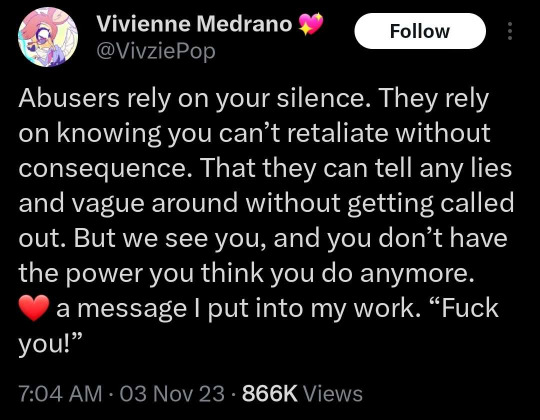
“Abusers rely on your silence. They rely on knowing you can’t retaliate without consequence. That they can tell any lies and vague around without getting called out. But we see you, and you don’t have the power you think you do anymore. A message I put into my work. “Fuck you!” - Vivienne Medrano
Medrano, who has vague and sub tweeted individuals like Lackadaisy Tracy, The Diregentlemen, Michael Kovach, and Ashley Nicoles. Medrano who has instigated and incited harassment campaigns knowing that no one can call her out without severe and relentless backlash from her cultish fanbase that she personally encourages through positive reinforcement of liking the tweets of fans. Medrano who relies on the silence of other creators in the field due to the fear of her ire collapsing their projects before they even have a chance to begin.
Vivienne Medrano with an extensive abusive history that continues to this day, has something to say about abuse.
What Medrano has to say about abuse comes from someone who has the position of superiority in all of her relationships, but feels like she’s the outcast and bullied loser. Her self insert that is repeatedly expressed in every character at one point or another is how easily they abuse those around them just because they can, but that the narrative justifies their “acting out” because they are sad. According to the National Coalition Against Domestic Violence, “An abuser externalizes the causes of their behavior. They blame their violence on circumstances.”
Indeed, the lists of abusive characteristics and traits, according to the National Coalition Against Domestic Violence, overwhelmingly encompasses the characteristics shown by characters like Loona, Blitz and Stolas that Medrano repeatedly has attempted to rationalize, justify and minimize. Which, “An abuser often denies the existence or minimizes the seriousness of the violence [including emotional and mental abuse] and its effect on the victim and other family members.”
It is not surprising, then, that the conversation of abuse in Helluva Boss is often infuriating. The narrative underplays the harm done by characters we are supposed to see as “good”. Not allowing for them to grow or change, but ignoring and minimizing the behavior, justifying it through circumstances and perpetuating the false belief that victims are not, themselves, abusers.
One of the first blog post rants I ever made about mental health and abuse was the affirmation that not all victims of abuse are survivors. I wholly stand by that. Victims of abuse perpetuate abuse. A victim and an abuser are one in the same, whereas a survivor is someone who has actually done the difficult work of being self-critical. And the one thing we all are very aware of is how much Vivienne Medrano rejects criticism.
#helluva boss critical#helluva boss criticism#helluva boss critique#vivienne medrano#vivziepop#vivziepop critical#spindlehorse critical#spindlehorse criticism#vivziepop criticism#helluva boss#perpetuating abuse#narcissistic abuse#abuse breeds abuse#essay writing
242 notes
·
View notes
Text
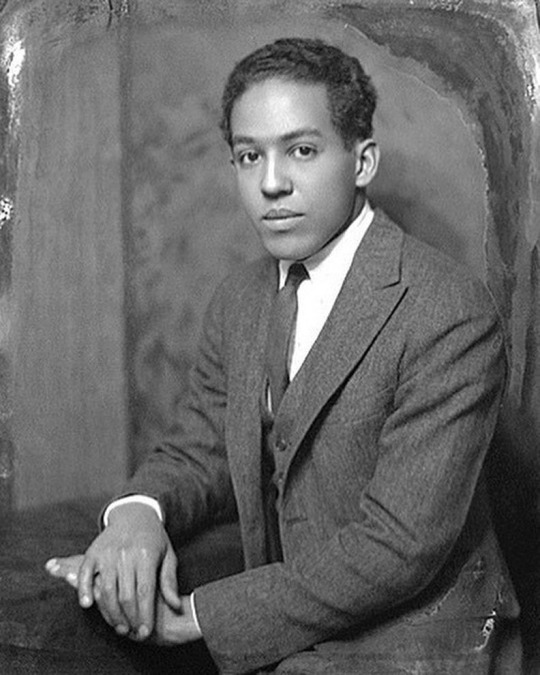
Today In History
Langston Hughes was a prolific writer who worked in many genres: poetry, fiction, nonfiction, drama, musicals, and children’s books.
As a popular newspaper columnist, Hughes created a fictitious Harlem narrator named Simple. Deeply interested in developing a black theater, Hughes founded the New Negro Theater in Los Angeles March 19, 1939.
His life and work were enormously important in shaping the artistic contributions of the Harlem Renaissance. He wanted to tell the stories of his people in ways that reflected their actual culture, including both their suffering and their love of music, laughter, and language itself.
CARTER™ Magazine
#langston hughes#guru#dj premier#carter magazine#carter#historyandhiphop365#wherehistoryandhiphopmeet#history#cartermagazine#today in history#staywoke#blackhistory#blackhistorymonth
139 notes
·
View notes
Text

The 306 Workshop Group in front of 306 West 141st St., late 1930s.
The 306 Workshop Group, also known as the Harlem Art Workshop, was founded by artist Charles Alston. This group served to bring together Black artists such as Jacob Lawrence, Romare Bearden, Augusta Savage, and Langston Hughes, just to name a few. Located at 306 West 141st Street in Harlem, the Harlem Art Workshop provided these artists with both a meeting and work space.
In the 1920s, Harlem became a coveted address. The neighborhood in New York City was synonymous with an outpouring of production in the visual arts, music, literature, theater, and dance that some began referring to the creative era as the Harlem Renaissance.
Famous artists of the Harlem Renaissance included: sociologist and historian W.E.B. Du Bois, writers Claude McKay, Langton Hughes, and Zora Neale Hurston, musician Duke Ellington, and entertainer Josephine Baker. These artists strove to express their racial identity and pride.
Jacob Lawrence, an artist of the Harlem Renaissance, believed his paintings were “a portrait of myself, a portrait of my community.” The community he grew up around included artist and mentor Charles Alston and leading philosopher Alain LeRoy Locke.
The people of Harlem and their rich heritage were constant sources of inspiration for Lawrence. The community experience—its triumphs and tragedies, its dreams and disappointments, its pleasures and humility, collectively forged by the Great Migration, the Harlem Renaissance, and the Depression era—lives on in his paintings.
Photo & text: Phillips Collection
#vintage New York#1930s#Harlem Renaissance#306 Workshop Group#Harlem Art Workshop#1920s#vintage Harlem#Charles Alston#Jacob Lawrence#Romare Bearden#Augusta Savage#Langston Hughes
124 notes
·
View notes
Text
To what purpose, April, do you return again? (or: finally, a pinned post for April)
Hi all. I'm Jessie Lynn McMains, aka Rust Belt Jessie. I'm an Xennial/Elder Millenial (please don't call me a Geriatric Millenial, thank you) writer/artist/zine-maker/etc. (I wear many hats.) I'm queer and nonbinary/genderfluid, and as far as pronouns go, I’m okay with any human pronoun (they and she are my most-used, but I like he, too, and I especially like it when people switch up the pronouns they use for me). I’m disabled and neurodivergent.
I live with my partner and our two kiddos, both of whom are also neurodivergent, and right now I’m supporting all of us on whatever money I earn. I do freelance copywriting and editing as my main thing, but I also make a decent chunk of my income from selling my zines and books and pins and whatever else I make, so the more I sell, the better able I am to pay bills and take care of my family.
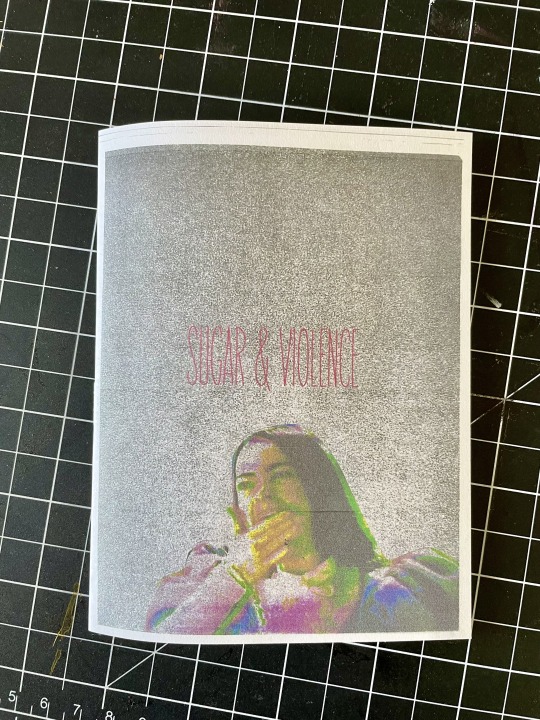
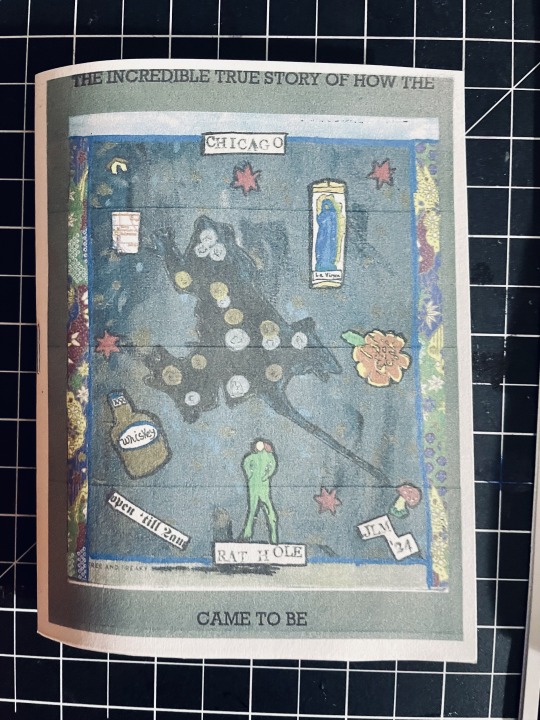

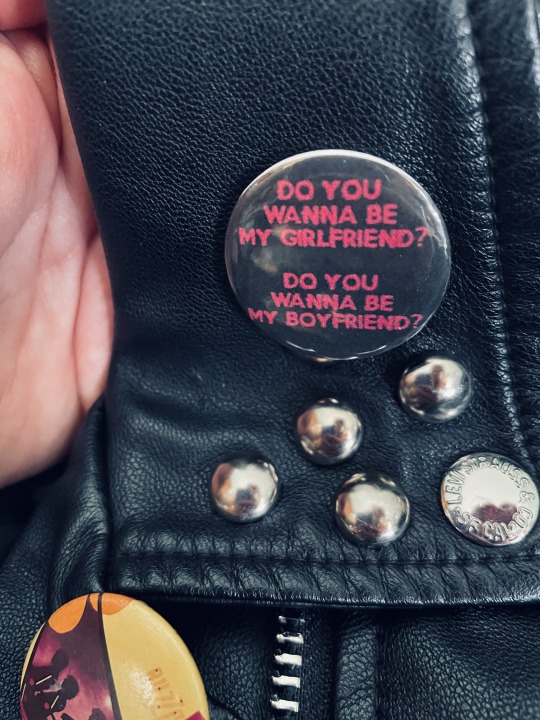
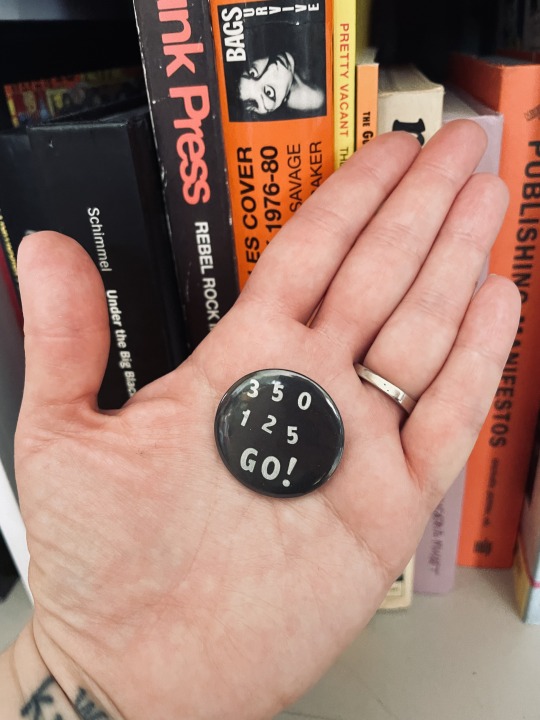

Through my Ko-fi, you can buy my zines and books (I have both poetry and prose available) and pins, as well as commission me to make you a music-inspired mini-collage or hire me to edit your own writing. Or also just throw me a few bucks if you appreciate the content I make available for free.
If you live outside the US (I can only ship within the US via Ko-fi, because setting up shipping for multiple countries is a pain the butt), or just prefer to purchase something or donate via a different platform, I also have PayPal and Venmo (@ JessieLynnMcMains).
I also have a Substack newsletter. I try to send something out at least once a month. Sometimes it's a longer piece about music and nostalgia (I recently started a series called These Fucking Songs, for just that purpose), sometimes it's just updates on what I'm up to, sometimes it's something else. I'm currently working on one about poetry, and my writing process, and revision.

As if that weren't enough, this month I'm doing a 30/30 on the Tupelo Press site, which not only means I have to write a poem every day to be posted the next day, but I am also fundraising for Tupelo Press. My goal is to raise $350 by the end of the month. You can follow along with my daily poems here (the newest is always at the top; scroll down to read previous days), and the fundraising page is here. (I'm also offering some cool incentives for people who donate; more info about all that is available on the fundraising page.)
I'm pro-trans, pro-vaccine, pro-sex worker, pro-abortion, pro-Black Lives Matter. I'm for harm reduction for any drug user or addict, meaning I want them to be able to use drugs as safely as possible, rather than forcing them into rehab or incarcerating them. I'm anti-censorship and anti-fascist. I believe everyone, everyone, should have a safe place to sleep and enough to eat without having to earn it. I consider myself an anarcho-socialist, basically, but I do vote. I'm telling you all that because if you are vehemently against any of those things, we'll probably not get along.

I'm a forever-goth/punk who loves all kinds of music. (Things on heavy rotation for me as I write this are: The Replacements, Einstürzende Neubauten, and Oliver Nelson.) I'm femme but I'm a disaster femme; when I use nailpolish it's always sloppy and/or chipped, when I wear eyeliner it's always crooked and/or smeared, and I am incapable of not ripping a hole or two in every pair of tights and stockings I own. I love art and film and theater and literature and music. I'm a Shakespeare stan, I love growing my own vegetables, I collect souvenir pennies and stick and poke tattoos. I'm always a slut in theory, even when not always in practice. I'm perpetually nostalgic, melancholy, and restless. I spend all my free time posting pictures of myself on the internet and trying to prove I'm punk to anyone that'll listen.
Want more Jessie content? There's my website (still under construction, but it exists). Or you could try searching the my writing, my art, Jessie Lynn McMains, or Rust Belt Jessie tags on this blog. I also have a side blog, where I tend to post more frequently than I do on this blog. If you ask nice, I'll probably give you the URL.
On that note, my DMs and asks are open, and, as of right now, anon is on.
I think that's it! As always, whether you can send any $$ my way (or to my fundraiser) currently or not, keeping this post circulating helps. Thanks much. 🖤
67 notes
·
View notes
Text
Wish Rewrite
Thought I’d try my hand at rewriting Wish for fun. In my version, Asha is Magnifico's daughter. This gives them a more compelling relationship, a more plausible reason for Asha to find out his secrets, and officially makes Asha a royal princess to boot. Additionally, Magnifico is a sympathetic tragic villain, and Amaya has passed away. While I would love to see a fully evil version of Magnifico that’s better written, along with an evil Amaya (I LOVE @hah-studios‘s version here), my version of the story features a twist that heavily depends on his relationship with Asha.
Of course, this version would be 2D animated (or at the VERY LEAST have more ambitious and stylized CG that perfectly mimics 2D), and have songs written by people with actual musical theater backgrounds.
I am not a writer, so I apologize for the disjointed and clunky ideas.
Opening Storybook
“Once upon a time, in a world of magic, on an island in the Mediterranean Sea, there was a little kingdom called Rosas. The harvests were never quite plentiful, the town was barren and gray, and the work was long and hard. The people of Rosas knew life could be better, and spent many days wishing it were so.
“A young man, who called himself Magnifico, spent years studying magic to become a master sorcerer, in order to better the lives of those around him. He believed magic was the solution to make one’s deepest desire come true. The King of Rosas was impressed by Magnifico’s skills, as was the king's daughter Amaya. Magnifico and Amaya fell fast in love and soon wed, becoming the new king and queen of Rosas. Together, they brought joy and prosperity to the kingdom. It was a celebrated occasion when the queen announced she was with child.
“Unfortunately, the queen fell ill and died shortly after giving birth to the princess. The king was saddened by the loss of his wife, but he vowed to raise his daughter to become a worthy queen like her mother, and to better himself as a sorcerer so that such tragedy would never befall anyone ever again.”
Young Asha and Magnifico
Every Disney heroine this era has had an intro flashback of them as a child, so it only seems fitting Asha should get her own as well. We cut from the storybook to a scene of Magnifico, with a visible gray streak in his mostly brown hair, showing young Asha the stars before tucking her into bed.
She asks if anyone wishes on the stars anymore. Magnifico explains that people stopped doing that because the stars never answered. Perhaps the stars could be magic, but no one has ever been able to study them because they're so far away. Perhaps one day.
🎶 At All Costs is reframed as Asha's lullaby.
Transition
Asha finally falls asleep and Magnifico kisses her on the forehead. Camera pans up to the night sky before fading to black. For a short moment, there is complete darkness, then some very faint sparks of light. Someone is calling Asha's name, but their voice sounds very far away, before it’s suddenly clear and Asha wakes up; it is morning. We are now in the present and Asha is 17. This establishes that she's always had the same odd dream of a dark void with faint sparks for as long as she can remember.
Present Day Asha
Asha is studious and hardworking, but is frustrated that her father does not trust her with more important duties. Magnifico is training her in magic to succeed him, or at least he promised he would, but he seems hesitant to teach her more advanced magic than the basics. Asha has memorized every law textbook assigned to her, as well as a handful of magic textbooks she snuck from her father’s study.
Today Asha is going down to give a tour to new visitors, and she takes this very seriously. Dialogue implies Magnifico was hesitant to let her do this, but eventually gave in, hinting at how overprotective he is. Even more than wanting to prove her worth as a future ruler, Asha wants to connect to the people, and secretly wants a friend her own age.
Dahlia and Simon
In this version, Dahlia is older, and renamed to something like Yuki or Bianca to more subtly reference Snow White instead of Doc. Simon is also older and serves as Asha’s bodyguard, and references the Huntsman from Snow White instead of Sleepy. (Two new character designs would be created to reference Doc and Sleepy, and the seven teens are relegated to one-off townsfolk.) “Dahlia” and Simon are the only people Asha is close with, since her father is reluctant to let her leave the castle except on supervised royal duties. “Dahlia” serves as an auntie figure, and Simon is very understanding of Asha’s frustrations of being cooped up in the castle and occasionally lets her sneak off (but he always emphasizes safety and resourcefulness). She can confide in them when she feels she’s being ignored by her father.
🎶 Welcome to Rosas
The song would be cheery at first glance, but on closer inspection, it’s apparent Rosas has seen better days. There’s some cracks in the buildings, and the murals and statues have lost some of their shine. The townsfolk and Asha explain it’s just a bunch of minor hiccups, and they’re working on it.
The visitors ask if there are rules for wishes being granted. Asha and the townsfolk explain the basic rules (which include no wishing for death or harm, no making people fall in love, and no wishing for the dead to be brought back to life; as a shout-out to Aladdin). Also, Magnifico does not grant them right away, but needs time to make sure the work is done just right. After all, magic is a science as well as an art.
When the visitors ask the townsfolk about wishes that have previously been granted, they're told about relatively simple things, like being given a new food cart or a pet cat. This foreshadows what Magnifico does with their wishes. When the townsfolk are asked if they had ever wished for something more significant, they stumble for an answer. They say they're just content with what they have, but they seem unsure. Some of the townsfolk appear lethargic, and some even slightly fumble during their dance routine, but manage to make the big finale. They ask the visitors if they’ve been convinced to live in Rosas and are given a noncommittal answer, “Too soon to say. We'll just stay the night and see how it goes.” Asha brings the new visitors to her father. (Sabino’s character design can be re-used here as one of the visitors, as he’s no longer Asha’s grandfather in this version.)
Side note, I would love it if some of the townsfolk were given a few notable quirks to stand out. The artbook for this movie was lovely, but in the final film, all the townsfolk sort of blend together into genericness. The only one I can recall from the movie with clarity is the girl who wished to fly and meets “Peter Pan” in the end. Even Ecanto’s “We Don't Talk About Bruno” had memorable townsfolk and most only had a single line of dialogue or less. The seven teens would of course feature in this song number.
Present Day King Magnifico
Magnifico's hair is completely gray and white now, and he’s got wrinkles under his eyes. He seems burnt out from his job, but puts on a professional face for his subjects and visitors. Asha is the only one Magnifico shows any tenderness. But for the most part, Asha feels her father has been distant for a long time.
Magnifico thanks Asha for bringing the visitors and tries to dismiss her, but she argues she should start sitting in on the wish-granting sessions so that she can properly learn to take over from her father. This is an argument they have gone over many times before, and her father finally relents today.
The inciting incident
They begin the consultation, starting with Sabino. Magnifico specifies that the wisher must meditate and reach deep within themselves, and recall their desire with every fiber of their being, which manifests as a wish orb. In this version, while a wish orb contains the many memories of the wish in question, handing it over does not automatically erase the memory of it from the wisher.
When Asha and Sabino’s backs are turned, Magnifico does something to the wish. This hints that Magnifico steals wishes and plants false memories, so that the wisher is unaware that they were granted a false wish. In many cases, Magnifico grants a much simpler wish than what the wisher desired (This is hinted at earlier in “Welcome to Rosas”.). Magnifico finishes collecting wish orbs and tells everyone to come back later tonight for them to be granted. Asha wants to stay and help her father more, but he quickly dismisses her.
Later that night, when Magnifico grants a false wish for Sabino, and Asha is suspicious because she knows it is not what he actually wished for. (Sabino’s wish could still be the same one from the movie, perhaps refined to something like, “I wish to leave a lasting legacy that will inspire the next generation, and that I won’t be forgotten.” And when Magnifico grants the wish, it has been reduced to “Your wish to write a memorable song.” or something along those lines. Side note, in the movie I was totally expecting Asha to tell her grandfather that he already inspires her everyday, so his wish had in fact already been granted, so I was quite disappointed when that did not happen.)
Magnifico deflects and dodges the question, and tries to gaslight Asha into thinking she misheard or misinterpreted Sabino’s wish, and that this is why she’s not ready and should wait a while before she’s taught more magic, and basically shoos her away for the night. Asha is too frustrated at her father to dwell on the discrepancy she caught, and storms off.
🎶 This Wish
This song is reframed to be a more straightforward “I Want” song. In this version, Asha wishes to be taken seriously and supported by her father. She feels quite alone and wants someone to believe in her. “Please stop seeing me as a helpless child. …I wish someone would notice my potential.” Star descends.
Star
Would of course, follow the scrapped shapeshifter design from the artbook. I refer to Star as male here, but I am also open to the idea of them being designed as a genderless character. I also think it would be fun if Star could rapidly switch between art styles when he’s excited (2D classic, CG, 2D sketchbook, 2D Picasso, CG mimicking stop-motion / paper puppets, etc). Maybe he can also occasionally transform into his chibi form from the movie when sneaking around.
Star is very weird, almost like an alien. He seems to have general knowledge of various things on Earth, but can never seem to get them exactly right. For example, he never transforms into a normal animal. There’s always a fantastic element; instead of turning into a normal rabbit, he turns into a jackalope. In addition to having a personality inspired by Peter Pan and Genie, he is also a less chaotic version of The Collector from The Owl House and Discord from My Little Pony.
Star would also be incredibly powerful. Instead of only making animals and plants sing, he can also change their size, color, species in the blink of an eye (and maybe even change their art styles). He can spontaneously conjure random outfits from all time periods (including the future) for the animals to wear. He can also change the shape of the landscape; at one point, Asha could suddenly find herself in the middle of an elaborate maze that Star conjures to tease her.
🎶 “Star’s Song”
A new song inspired by Genie’s “Friend Like Me” and Maui’s “You’re Welcome”. Replaces “I'm A Star”, which I didn’t really like. (It had far too many words to poorly explain weird worldbuilding, and I wasn’t a fan of the rhythm. Though to be fair, I dunno if the worldbuilding in my version is all that strong either, lol.)
Star basically shows off all kinds of weird things he can do with various transformations and conjurings. He elaborates he comes from “someplace beyond the edge of the world” and that he’s often found Earth fascinating, but never found any reason to descend until he heard Asha. There’s something special about Asha he can’t quite put his finger on. This foreshadows the reveal.
Valentino
Quick detour, I don’t hate Valentino. I think there is great story and humor potential, especially in regards to his deep voice provided by Alan Tudyk. Unfortunately, in my version, I felt Asha’s sidekick needed to be someone who could quickly keep up with her. At first I thought about changing him into a bird, but then I thought it would be funnier if he was a pet goldfish and Star granted him the ability to fly and breathe out of water. Fish Valentino is happy to not be cooped up in a pool, but is fond of Asha and content to stay with her instead of flying off. For the most part, he offers moral support and perhaps helps Asha make friends with the other animals, but otherwise I don’t really have many ideas for what to do with him.
The Middle Part
Admittedly, I couldn't come up with a definitive idea for this part. Basically, there needs to be a reason for Magnifico to be occupied and unaware of Star’s presence; a reason why Asha does not immediately tell him about Star. One silly idea I had is Asha immediately tries to tell him, but we turn around and find Star’s conjurings and alterations gone and everything is back to normal. Magnifico brushes this off as Asha having a weird dream and tries to tuck her into bed. Star reappears later and explains he wants to run around and have fun first before being “studied” by Magnifico. Other ideas include:
Asha thinks Star is the answer to Rosas’s and her problems. Star agrees to grant various wishes, and let Asha take the credit, in hopes that her father will notice her and finally take her seriously and teach her real magic. Star thinks this will be a great opportunity to see more of Rosas and have fun, and Asha is frustrated enough with her father being dismissive of her to agree to this.
Alternatively, Star will teach her magic. Problem is, Star’s magic is wild and unlike anything Asha has studied in her father’s books. Star is incredibly powerful and Asha has to constantly ask him to tone it down. She runs around trying to fix the chaotic results of the wishes he grants, and this attracts the attention of her father.
Alternatively, with Star’s help, Asha grants small wishes, and fixes things around town. For the most part, everyone is grateful, except for one grumpy older citizen (maybe an older version of Gabo) who remembers “the good ol’ days” and thinks Rosas needs more competent rulers than Magnifico and Asha. An argument breaks out and attracts the attention of Magnifico. Alternatively, again, this could also be replaced with someone who instead wants a selfish wish like a mountains of riches, or to be king and replace Magnifico, and Asha refuses to grant it, leading to the argument.
🎶 “Not What I Expected”
Montage of Star and Asha granting people’s wishes. Includes lots of hijinks of Star overdoing things and Asha getting Star to undo them (For example, someone asks for a new cottage, and Star conjures a giant mansion with mismatching colors and architectural details, and upside-down rooms.). “Dahlia” and Simon help them to ease tension with the townsfolk, especially after Star reveals himself to be a non-human magical being. The seven teens can also appear here again in one-off gags. Along the way, Star and Asha experience the joy of community and begin falling in love with each other. Star slowly learns about being human and cares about the townsfolk as much as Asha does, and Asha is given the freedom to take charge and be responsible but is also surprised to find just how good it feels to finally connect with the townsfolk after being cooped up in the castle for so many years. Star and Asha both find each other fascinating and full of energy, and are glad for each other's support.
Perhaps there’s a dance with the townsfolk. When earlier during “Welcome to Rosas”, the townsfolk were lethargic and clumsy, here they are more spirited and coordinated. Star is incredibly happy and shines bright, and his light “melts” away Magnifico’s false memory spells. The townsfolk finally wake up and are confused as they recall their true wishes and do not understand why Magnifico lied to them. Asha and Star go to confront Magnifico.
Confronting Magnifico
Star senses something in Magnifico’s study. They find a secret room that holds the records of every wish Magnifico has ever stolen. Asha is in disbelief, but can’t ignore the fact that her father has been distant and negligent of the town for a long time. And maybe this would explain why Magnifico doesn’t teach her magic or let her do anything, because he had no intention of giving the throne to her. They find some documents about using wishes as life force, and conclude that maybe Magnifico was using everyone’s wishes to become immortal. Magnifico walks in on them.
🎶 “Everything I Do”
Replaces "This Is The Thanks I Get?!" and "Knowing What I Know Now" This new song is not quite a villain song. It’s a duet between Magnifico and Asha, of them arguing back and forth. Asha argues to her father that he’s lost sight of his responsibilities and that he only cares about staying in power; Magnifico argues that Asha is naive and could never understand that everything he does is for her benefit, and she argues back how could she when he never tells her anything.
The reveal
Magnifico had an impossible wish: to bring Asha back from the dead. Baby Asha in fact died almost immediately after birth. Magnifico could not bear losing both his wife and his daughter, and desperately wished for Asha to live again. However, no magic can bring the dead back to life. Instead, what ended up happening is a new baby was created from Magnifico’s wish orb. In his anguish, his desire was so strong it brought a new person into being. (Side note; this does in fact mean that the original baby is still dead, so Magnifico had to secretly bury a dead baby to hide the fact that Asha is an artificial human taking her place. Perhaps a bit too morbid of an implication for a modern Disney movie, but my mind likes to go to weird places.)
At first Magnifico was happy. It was a miracle come true. But over time, the magic would run out and Asha would begin to fade. Magnifico used his own magic and tried to wish again to fuel Asha's form, but it took a toll on his health and age. This explains why his hair turned white so quickly. So eventually he began using his subjects' wishes. The more heartfelt and significant the wish is, the more powerful it is, which is why Magnifico ends up replacing the townsfolk’s wishes with simpler things and false memories that didn’t require much magic.
As Asha grew older and became a more complex human, more wishes were needed to fuel her. This is why Magnifico refuses to teach her magic, because he is afraid that she would accidentally use up the magic that makes up her being instead of the magic that a regular sorcerer would draw from the environment around them.
Magnifico grew more desperate to draw in new citizens to get more wishes, while also exhausting more wishes from the townsfolk already living in Rosas, leading them to become lethargic. Keeping track of so many wishes and false memories to cover his tracks took a toll on Magnifico’s mental state. Also a growing bitterness that he has to live with this burden that no else could ever know, and perhaps resenting the people of Rosas for getting to live worry-free.
This is why Star answered Asha's call: she is a living wish who made a wish of her own.
Asha's death
Magnifico and Star fight. Asha gets caught in the crossfire trying to stop it. It’s a heart-wrenching moment as glowing cracks form all over Asha’a body. She looks to her father with absolute terror in her eyes as cracks spread across her face. Her legs snap. Magnifico runs to his daughter a second too late and just fails to catch her body as she disintegrates into stardust.
Star stares in disbelief as Magnifico screams in agony: “YOU COULD HAVE LET ME SAVE HER!” He looks like he’s about to attack Star in revenge, but quickly gives up and falls to his knees.
“...Nothing matters anymore.”
There is no need for an evil book as a lazy plot device. Years of paranoia and bitterness have reached a breaking point with Asha’s death, and now Magnifico’s magic is corrupted green by his anguished heart. He transforms into a monstrous dragon-like creature (in homage to Maleficent). This creature is blind with rage, and in a great roar it bursts from the castle, causing it to collapse. The creature summons storm clouds that cover the sky and fierce green lightning that strikes the town, destroying buildings and terrorizing the townsfolk. Monster Magnifico also spreads a green fog that drains everyone’s energy. As the good king he brought joy and hope, but now as a monster he brings only despair. (Inspired by Madoka Magica, when magical girls turn into witches.)
Star attempts to stop Monster Magnifico while also shielding the townsfolk from harm. Rubble from the buildings collapse and bring the camera to black.
Beyond the Edge of the Universe
A short moment of complete darkness and silence.
Slowly, faint sparks shine in the darkness. Asha’s voice weakly asks, “Where am I? ... Who am I?”
The faint sparks grow into a kaleidoscope of colors. Asha has been reduced to a single spark. Her consciousness floats in the chaotic void beyond time and space, where Star comes from. She quickly feels overwhelmed in this sea of color and sound. It’s a great big cacophony of voices all jumbled together, like musical instruments all playing off-key all at once.
A blue light in the distance grows brighter and closer before it reveals itself to be the Blue Fairy from Pinocchio (Disney's first wish-granter). She welcomes Asha’s consciousness. “Hello, little one.” She explains this is a space between worlds, where the emotions of humanity reach far across time and space.
“Listen carefully…” The Blue Fairy helps Asha’s consciousness tune into the voices of the void to hear the words clearly. These voices will be familiar to the audience.
Asha’s consciousness hears the hopeful, longing voices of Snow White, Ariel, Hercules, Rapunzel, and Moana. (This can include snippets from their “I Want” songs.)
She hears the wicked laughter and the dark, selfish wishes of Maleficent, Ursula, Jafar, Scar, and Facilier. (This can include snippets from various villain songs.)
She hears the sad voices of Cinderella, Belle, Quasimodo, Tiana, and Mirabel at their lowest points. ("There's nothing left to believe in. Nothing." and other such lines.)
(Yes, this basically establishes a Disney multiverse. As I’m writing this, I think visually this could resemble the Ahtohallan scene in Frozen 2, but in space instead of in ice.)
(February EDIT: I randomly thought it was also be a neat idea if all magic in the universe originates from this realm. Pieces of magic fall into the different worlds and adapt to make their own unique rules depending on the world. For example, Cinderella's fairy godmother could come from here, as well as the drop of sunlight that grows into Rapunzel's flower. A drop of magic could fallen into a certain world, becoming a trident and transforming the local sea life into merfolk, who would then go on to build Atlantica. Little sparks seeping to random worlds could also explain certain things in otherwise non-magical worlds, such as why toys and video games come to life.)
Not many humans come here after death, but Asha is a special case, as she is literally made up of hopes and dreams. She is spontaneous life (The Blue Fairy of course has experience in this department.). Asha’s consciousness finds herself moved by all the voices of the dreamers and wishers throughout the universe, and thinks she wouldn’t mind going to sleep forever in this void. She just feels so tired. She almost fades away until she hears Star's voice, her father's voice, and the people of Rosas whose wishes made up her very being. She remembers being human. The spark of Asha’s consciousness shines and she returns to her human form. The Blue Fairy asks her, “What will you do now, little one?”
Asha hears the anguished cries of the people of Rosas in trouble, and she decides she must return to help them. The Blue Fairy smiles, and tells her, “Before you go, there’s someone who’d like to meet you.”
She gestures behind her to reveal Queen Amaya and the baby Asha. Asha is stunned to see them, but is overcome with emotion, and Amaya embraces her.
“I am so proud of you, Asha. I wish I could have stayed and been your mother. Please, take care of your father for me.” Amaya gives her a kiss on the forehead, and the baby Asha gives her a happy giggle. The Blue Fairy tells Asha to close her eyes and think of home.”
Return to Rosas
Asha is reborn in a great big burst of light in the sky and gains a new dress made of starlight. Monster Magnifico has not noticed her and is still rampaging the kingdom. Asha sees Star has been defending the citizens, but is exhausted, and Magnifico finally manages to strike him down. Finished with Rosas, Monster Magnifico turns to the coast, intent on continuing his destruction to the mainland.
Asha descends to help Star get up. He is surprised to see her, but her appearance reinvigorates him, and explains the situation to her. They turn to the frightened people of Rosas and promise them that they will fix this. They take hold of each other’s hand and fly to confront Monster Magnifico.
🎶 Combined This Wish and At All Costs Reprise
Monster Magnifico does not recognize Asha, and tries to strike her, but she and Star conjure a magical shield. They dodge lightning and repel Magnifico’s fire breath. Asha begins singing, determined to reach out to her father. There is a moment where it appears Magnifico has gained the upper hand.
“Dahlia” and Simon are inspired and lead the townsfolk into the song. Asha and Star, combined with the hope of the people of Rosas, shine brighter than ever before, dissipating the fog and melting away Magnifico's monstrous form. The storm clouds are cleared away in a shower of sparks. Asha grabs her father’s unconscious body and holds him tight in her arms as she slowly descends to the ground and sings her lullaby. Magnifico is very disheveled (maybe even a little bit of fanservice with his top torn off), but is otherwise alright. He soon comes to.
"...Amaya? ... ASHA!" Magnifico is in disbelief, but overjoyed to see his daughter alive and well. He embraces her and bursts into tears. “I thought I lost you! I thought you were gone!”
"I was. I disappeared beyond the edge of the universe. But I came back!"
Rebuilding Rosas
They turn to the townsfolk. Asha gives a speech about how not every wish should be granted, but that does not mean they’re not worth pursuing. It just requires careful consideration, and being open to finding a something new. (Someone with better writing skills please step in to write this speech without making it too sappy.)
Magnifico is greatly ashamed of the harm he has caused and steps down as king. Asha understands if the townsfolk do not want to see them anymore, but promises to do what she can to help them rebuild, and to help them pursue their dreams in an ethical manner. Star concurs. The townsfolk, having been touched by her earnestness and genuine emotions from when she helped grant their smaller wishes, embrace her with open arms and express that they would love if she remains their ruler. They are hesitant to forgive Magnifico, but think it's for the best that he be allowed to stay with his daughter.
Cut to some time later, and there is scaffolding all throughout town and the castle. Star and Asha have been using their magic to help with the rebuilding, with mixed results. Progress has been slow, but the people are hopeful. Asha and Star hold daily consultations with the people who were granted false wishes. Some are easy to grant, while others Asha advises that they can pursue on their own. (The girl who wished to fly meeting "Peter Pan" can be re-used here. I honestly thought that was a clever bit. While she could easily fly with magic, I like that the movie implies she'll find more meaning in learning to build a flying machine.)
Asha visits the original baby Asha’s grave. She renames herself. Perhaps to something like Stella? “I loved being Asha, but now I think it’s time I return your name back to you. Thanks for the loan.” She conjures some flowers for her and Amaya's grave, and goes to join the celebration.
🎶 “Finale Party Song”
Asha/Stella, Star, the townsfolk, and even Magnifico join in on the grand finale. Asha/Stella and Star kiss, and Hidden Mickey fireworks light up the sky.
End Credits
While the end credits were cute, I would revise them to include characters from the missing movies (the package films, The Rescuers, Black Cauldron, Meet the Robinsons, etc.). I would also change some of the character selections (For example, I'd have the three kittens represent The Aristocats, instead of just Marie by herself. It always annoys me to no end when they market Marie by herself. I'd also swap out Yokai/Professor Callahan with Baymax. What an odd decision to have Yokai of all characters represent BH6.). And also have some of the characters be animated instead of just still images. (I liked for Cinderella's credit they had a trail of sparkles surround her, but it would have been even better to actually see her transform from her ripped dress to the ballgown.)
Closing notes
There are a lot of things in my version that could use some more polishing, like the build-up to Magnifico's reveal about Asha. There should be at least one scene that foreshadows that the times when Magnifico tucks Asha into bed is when he magically absorbs the wishes into her to fuel her.
In addition to the whole wish theme, I thought it would be neat to also include themes of legacy, to tie in to Disney's 100 Anniversary. Disney Animation has come a long way, but is still capable of making big missteps. With many of the old talent gone, it's understandable that passing the torch to the next generation would make anyone nervous, but despite it all, I do have faith that Disney Animation can make a comeback. They've been through low points before; we just have to wait and see.
#wish rewrite#includes a plot twist and a connection to the Disney multiverse#disney wish#wish 2023#wish movie#princess asha#king magnifico#star boy#star x asha#asha x star#wish critical
126 notes
·
View notes
Text
I'm doing an introduction to my blog bc I've gained a lot of new followers recently so here we go
Nicknames: Hops, Spottie
Fav color: red and black
Fav musicals: Newsies, Funny Girl, West Side Story, Dear Evan Hansen, In the Heights, Chicago, Falsettos, Waitress
Fav character: Sprace
Fav Canon ship: Nico and Will from pjo
Fav non Canon ship: Sprace
Fav Theater songs: Brooklyn's Here, Requiem, When He Sees Me, Breathe,Cool, Jet Song, Dont Rain on My Parade, Cell Block Tango.
Eye Color: Grey and Blue (it changes)
Hair Color: Blonde
Height: 5'2 unfortunately
Tw for my blog: I cuss a lot and am really unhinged so be warned ig
Future Career: Broadway Actress and Writer
Current after-school activities: Theater, Band, Choir, piano lessons, GATE, NJHS.
Favorite books: The Inheritance Games
#newsies#spot conlon#92sies#racetrack higgins#sprace#jack kelly#davey jacobs#newsies incorrect quotes#west side story#in the heights#waitress#chicago#brooklyn#them brooklyn boys is big#tommy bracco#newsies broadway#marching band kid
36 notes
·
View notes
Text

Pride started with a protest. Pride Month is a declaration of the fight for freedom for all LGBTQ+ people. It is a way to honor our history, resilience, and collective resistance. For those of us who have the privilege, one act of resistance can be coming out publicly as a member of the LGBTQ+ community. And Amber Ruffin did just that during the last day of Pride Month.
On June 30, 2024, multi-talented comedian, writer, and television host Amber Ruffin posted a picture of herself rockin’ a purple shirt that read “QUEER.” The caption of the photo read:
“In what will come as a shock to exactly zero people, I’m using the last day of PRIDE to come out! Be proud of who you are, babies! I know I am! And I can’t wait to be discriminated against for a new reason!!”

Amber gained widespread recognition as a writer for “Late Night with Seth Meyers,” where she became the first Black woman to write for a late-night network talk show. Her segments, such as “Amber Says What?” and “Jokes Seth Can’t Tell,” showcased her sharp comedic skills and her ability to tackle serious issues with a light-hearted approach.
In 2020, Amber continued to break new ground when her critically acclaimed and Emmy-nominated “The Amber Ruffin Show” was launched on the streaming channel Peacock. The show combined sketch comedy, monologues, and musical numbers, often addressing racism, sexism, and homophobia.
Amber has also recently garnered success in the world of theater as co-writer for the “Some Like It Hot” revival, for which she was nominated for a Tony Award, and updating the book for the Deborah Broadway Cox-starring hit, “The Wiz.”
Amber, thank you for sharing your journey with us!
22 notes
·
View notes
Text
Fan Fiction: Final Part
Pairing: Dean Winchester x Female!Reader
Word Count: ~1.9k
Warnings: canon angst and violence, extra angst
Summary: Not only did Chuck write books about your lives, but a damn musical theater is putting a play on about your goddamn lives. You try to let them handle this one on their own but they're not letting you go, and it's time to bring insurance to make sure you never leave them.
Season Ten Masterlist
Author’s Note: I do not own anything from Supernatural. All credit goes to their respective owners. I love seeing any and all comments <3

x
Marie and Maeve are back in the auditorium but Marie is panicking.
"Hey!" Dean exclaims and rushes over to Marie. "Are you okay?"
"Not really," she gasps.
"Why don't you guys calm her down and I'll find wooden stakes in the trunk."
Sam leaves and Dean kneels down to get on Marie's level.
"Is Marie gonna get eaten?" Maeve asks.
"If we're lucky," you glare.
"Nothing is going to happen. Don't listen to her. Marie, look at me." When she does, he continues. "As soon as that curtain rises, we're going to be there to take out Calliope."
"This is all my fault. If I hadn't written this dumb play, none of this would've happened."
"First of all this play isn't dumb." You open your mouth to say something when Dean glares at you. "It's not dumb."
"I thought you didn't believe in this interpretation?"
"I don't. Like, at all, but you do. I need you to believe in it with all you've got so we can kill Calliope and save your friends. Can you do that?"
"Yeah." She takes a deep breath. "If Sam, Dean, and Y/N were real, they wouldn't back down from a fight. Especially my sweet, brave, selfless Sam. There's nothing he can't do."
"I'm not touching that subject," Dean shakes his head.
"Okay, let's do this!" She grabs a dark wig that the young woman was using who was playing Sam. "I understudy Sam. I used this for my one-woman Orphan Black show, last year. it's gonna have to work for Sam." She puts the wig on her head. "Writer. Director. Actor. I'm gonna Barbra Streisand this bitch."
Guess it's time for a fucking show. People pile into the auditorium once the show is about to begin to see this either rock or go up in flames. The curtains are closed so no one sees what's happening backstage. The girl who plays Dean walks past Dean wearing the amulet that Sam gave him all those years ago. You're not sure what happened to that necklace.
"The Samuelt?" Dean asks Marie.
"That amulet is a symbol of the Winchesters' brotherly love."
Sam comes back with three wooden stakes he's prepared for the fight that will happen. He hands you yours, and you yank it from his grasp angrily. All the girls line up and Sam scans them with a frown.
"Wait a second, where's Chuck?"
"Oh, I love him, I do, but the whole author introducing himself into the narrative thing is just not my favorite. I kind of hate the meta stories," Marie says.
"Alright, listen up, girl," Dean announces. "Now, you're all here because you love Supernatural. I know I have expressed some differences of opinion regarding this particular version of Supernatural. Tonight is all about Marie's vision. This is Marie's Supernatural. So, I want you to get out there, I want you to stand as close as she wants you to, and I want you to put as much sub and add text as you possibly can. There is no other road. No other way. No day, but today."
"Did he quote Rent?" Maeve whispers to Marie.
"Now, you get out there, and you kick it in the ass!"
The girls cheer from the pep talk and encourage each other. They all separate to either go backstage or on stage as they get ready. You and Dean stand on one side of the stage while Sam stands on the other side, all with stakes in hand. Marie slips through the curtain to address the audience.
"This is stupid," you hiss at Dean.
"Shut up and keep an eye out."
"Good evening, everybody! Welcome to our production of Supernatural. I'm not gonna lie. It might be a full-on Gallagher show opening up this piece. Uh, those of you in the front rows may want to use the ponchos we provided for you under your seats. You may, in fact, get wet on this ride. Um, I would like to thank the cast and crew--"
"She's stalling. Let's do this," Dean says to Maeve.
"Copy that. Curtain, kids. It's showtime."
The music starts playing, making Marie jump in surprise.
"That concludes our introduction for the night. Everybody sit back, relax, and enjoy the show."
Marie scurries on stage as the curtains open. The beginning number of singing your life introduction sounds and the girl who plays Dean steps forward. The song you heard when you first arrived starts playing, and she goes through the song about how John and Mary got together, had Sam and Dean, your mother dying, blah, blah, blah.
Dean seems to be enjoying the song while you're absentmindedly playing at the thing on your neck. You can't fucking believe Dean did this. When did he have time to search for something like this? Has he been planning this for a while? Was Sam in on it? You look over at Sam in time to see the big scary scarecrow appear behind him. Apparently, Dean sees it too because he starts warning his brother who is confused.
"Turn around!" Dean yells slightly lower than the music playing. Sam turns to face the scarecrow who grabs him. This is all happening while the girls on stage act and sing. "Come on."
"Do we have to," you complain. Dean drags you along backstage to get to where Sam is, but the younger brother is nowhere to be found once you get to his spot. "Where the hell did he go?"
The first act ends and goes straight into the next one where Fake!Dean and Fake!Cas are having a conversation on fake phones.
"Okay, you can pop in tomorrow morning."
"Yes. I'll just wait here, then," Fake!Cas sighs.
Another song starts playing which is a solo moment for the girl who plays Cas. You and Dean rush over to Marie who is already backstage. Apparently, she saw the moment Sam was taken.
"What do we do now?" she panics.
"Just, stick to the plan, okay? Keep singing until the scarecrow comes for you."
"Don't die, okay?" you grin and pat her back as you walk away from her.
Marie walks on stage as soon as Cas' part is over so she can begin singing her part as Sam. She is nervous about what's about to happen but is acting like a professional. The scarecrow appears behind Marie to consume her, and that's when Dean jumps into action. He jumps onto the scarecrow, forgetting he's on stage in front of a large audience. Both Fake!Sam and Fake!Dean keeps singing as if this isn't happening behind them. You look to the audience to see one of the members in the front row put his poncho on.
The scarecrow and Dean wrestle before the monster throws Dean across the stage over to you. He slides right in front of your feet, and Dean glares up at you.
"Help!"
"Fine," you roll your eyes.
You twirl the stake in your hands as you walk onto the stage. You're not fucking scared of this thing. You'll fucking take it down before it realizes what's going on. The scarecrow runs at you to tackle you but you quickly move out of the way before he can touch you.
"Missed me!" you laugh.
You jump onto the scarecrow's back to strangle him but he grabs both your arms in retaliation. He uses all of his immense strength to flip you over him and to the front of the stage. You quickly get up and ram your stake into his chest. You turn him so his back is facing the audience and yours is facing the backdrop of the set. You step back from the scarecrow when you see it start to tremble.
The scarecrow explodes in a purple goo substance, covering almost everyone in the audience. A bit of goo gets on your jacket to which you huff out in annoyance. You walk toward Dean and shove the stake into his chest.
"You're welcome," you scoff and walk off.
Silence falls on the audience until the guy wearing the poncho stands up and begins clapping. Everyone in the audience follows suit, and Dean steps next to a starstruck Marie.
"Take a bow, Sammy."
Marie, Dean, and Fake!Dean takes a bow for the audience. It's a good time to take an intermission for the rest of the crew to get ready for the final act. Sam suddenly appears with Ms. Chandler and the other young girl who went missing. It's time to finally get out of this shitty town and back to the Bunker, so Sam and Dean are saying their goodbyes.
"You did good out there, kid," Dean says to Marie.
"You're not so bad yourself."
"You know what? This has been educational to see the story from your perspective. Keep writing Shakespeare."
"Even if it doesn't match how you see it?"
"I have my version, and you have yours."
The light starts flickering to signal it's almost time to go on again.
"One minute, folks. One minute," Maeve announces.
You and Dean walk away from Marie, but she stops him from going far.
"Dean?" She must believe you're who you say you are. "You should have never thrown this away."
She gives him the prop Samulet he noticed earlier. Dean chuckles as he takes it, and he admires it.
"It never really worked. I don't need a symbol to remind me how I feel about my brother."
"Just take it. Jerk."
"Bitch," Dean automatically says.
He quickly realizes it's not Sam he's talking to and blushes in embarrassment. Marie laughs at him before turning to you.
"Y/N, look, I don't know what's going on with you, but the Y/N I read about has a love so strong for Dean that nothing can break it. I just thought you'd want a reminder of it."
You take two steps closer to her before Dean has a chance to do something.
"The last thing I'd want to remember is my lame-ass excuse of a husband."
You turn and walk away, not missing the way Dean's eyes fill with sadness and hurt. What you're saying to him and about him is really hurting him, and that fact brings a smirk to your face. Dean pushes back the tears and walks to Sam.
"You know what, Dean? You were right. Staying cooped up isn't helping us. We need--"
It's as if the universe aligned perfectly because the next scene starts with Fake!Sam and Fake!Dean in the car. They're having a conversation that perfectly fits with what Sam was about to say.
"We need to get back on the road, Dean. Doing what we do best."
"What is that?" Marie asks.
"You're right, Sammy. Out on the road. Just the two of us."
"The two of us against the world," Fake!Sam says.
"What she said," Sam smiles and nudges his brother.
The scene moves onto a different one where all the characters get on stage to sing a cover of Carry On Wayward Son. Characters you know in real life. A girl steps on stage that you're not sure you recognize, but when you do, a smirk grows on your face.
"Who's that?" Sam asks Maeve.
"That's Adam. John Winchester's other kid. He's still trapped in the cage in Hell with Lucifer."
Poor son of a bitch.
"Carry on my wayward son / There'll be peace when you are done / Lay your weary head to rest / Don't you cry no more / Once I rose above the noise and confusion / Just to get a glimpse behind this illusion / I was soaring ever higher."
The song continues as Sam and Dean watch with raw emotion in their eyes.
"Masquerading as a man with the reason / My charade is the event of the season / And if I claim to be a wise man / It surely means I don't know / Carry on my wayward son / There'll be peace when you are done / Lay your weary head to rest / Don't you cry no more / Carry on."
You grab both of their shoulders and fit your head between theirs so they both can hear you above the singing.
"I am so glad I don't have a soul because that was painful to watch."
When you leave, Dean turns to Sam with tears in his eyes.
"Purifying her soul better work because I need my wife back."

x
Follow my library blog @aqueenslibrary where I reblog all my stories, so you can put notifications on there without the extra stuff :)
#dean winchester#dean winchester x reader#dean winchester fic#dean winchester fanfiction#dean winchester fanfic#dean winchester angst#supernatural#supernatural fic#supernatural fanfiction#supernatural fanfic#supernatural angst#spn#supernatural series rewrite#supernatural season 10
22 notes
·
View notes
Text
Fredi Washington
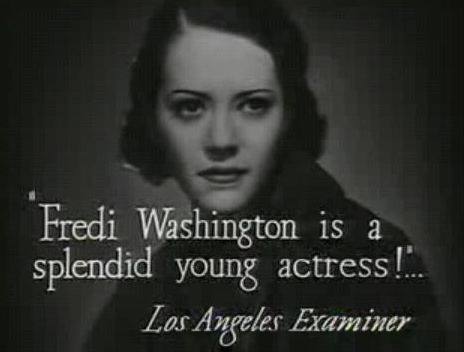
Fredericka Carolyn "Fredi" Washington (December 23, 1903 – June 28, 1994) was an American stage and film actress, civil rights activist, performer, and writer. Washington was of African American descent. She was one of the first Black Americans to gain recognition for film and stage work in the 1920s and 1930s. Washington was active in the Harlem Renaissance, her best known role being Peola in the 1934 film version of Imitation of Life, where she plays a young light-skinned Black woman who decides to pass as white. Her last film role was in One Mile from Heaven (1937), after which she left Hollywood and returned to New York to work in theatre and civil rights activism.
Fredi Washington was born in 1903 in Savannah, Georgia, to Robert T. Washington, a postal worker, and Harriet "Hattie" Walker Ward, a dancer. Both were of African American and European ancestry. Washington was the second of their five children. Her mother died when Fredi was 11 years old. As the oldest girl in her family, she helped raise her younger siblings, Isabel, Rosebud, and Robert, with the help of their grandmother. After their mother's death, Fredi and her sister Isabel were sent to the St. Elizabeth's Convent School for Colored Girls in Cornwells Heights, near Philadelphia, Pennsylvania.
While still in school in Philadelphia, Washington's family moved north to Harlem, New York. Washington graduated from Julia Richman High School in New York City.
Washington's entertainment career began in 1921 as a chorus girl in the Broadway musical Shuffle Along. She was hired by dancer Josephine Baker as a member of the "Happy Honeysuckles," a cabaret group. Baker became a friend and mentor to her. Washington's collaboration with Baker led to her being discovered by producer Lee Shubert. In 1926, she was recommended for a co-starring role on the Broadway stage with Paul Robeson in the play Black Boy. She quickly became a popular, featured dancer, and toured internationally with her dancing partner, Al Moiret.
Washington turned to acting in the late 1920s. Her first movie role was in Black and Tan (1929), in which she played a Cotton Club dancer who was dying. She acted in a small role in The Emperor Jones (1933) starring Robeson. In 1933, Washington married Lawrence Brown, the trombonist in Duke Ellington's jazz orchestra. That marriage ended in divorce. Washington also played Cab Calloway's love interest in the musical short Cab Calloway's Hi-De-Ho (1934).
Her best-known role was in the 1934 movie Imitation of Life. Washington played a young light-skinned Black woman who chose to pass as white to seek more opportunities in a society restricted by legal and social racial segregation. As Washington had visible European ancestry, the role was considered perfect for her, but it led to her being typecast by filmmakers. Moviegoers sometimes assumed from Washington's appearance—her blue-gray eyes, pale complexion, and light brown hair—that she might have passed in real life. In 1934, she said the role did not reflect her off-screen life, but "If I made Peola seem real enough to merit such statements, I consider such statements compliments and makes me feel I've done my job fairly well." She told reporters in 1949 that she identified as Black "...because I'm honest, firstly, and secondly, you don't have to be white to be good. I've spent most of my life trying to prove to those who think otherwise ... I am a Negro and I am proud of it."[7] Imitation of Life was nominated for an Academy Award for Best Picture, but it did not win. Years later, in 2007, Time magazine ranked it as among "The 25 Most Important Films on Race."
Washington's experiences in the film industry and theater led her to become a civil rights activist. In an effort to help other Black actors and actresses find more opportunities, in 1937 Washington co-founded the Negro Actors Guild of America, with Noble Sissle, W. C. Handy, Paul Robeson, and Ethel Waters. The organization's mission included speaking out against stereotyping and advocating for a wider range of roles. Washington served as the organization's first executive secretary. She was also heavily involved with the National Association for the Advancement of Colored People, widely known as the NAACP. While working with the NAACP, Fredi fought for more representation and better treatment of Black actors in Hollywood because she was one of the few Black actors in Hollywood who had some influence with white studio executives. Aside from working with those organizations to fight for the rights of Black actors, Washington also advocated for the federal protection of Black Americans and was a lobbyist for the Dyer Anti-Lynching Bill, which the NAACP supported.
Despite receiving critical acclaim, she was unable to find much work in the Hollywood of the 1930s and 1940s; Black actresses were expected to have dark skin, and were usually typecast as maids. Directors were concerned about casting a light-skinned Black actress in a romantic role with a white leading man; the film production code prohibited suggestions of miscegenation. Hollywood directors did not offer her any romantic roles. As one modern critic explained, Fredi Washington was "...too beautiful and not dark enough to play maids, but rather too light to act in all-Black movies..."
Washington was a theater writer, and the entertainment editor for The People's Voice (1942–1948), a newspaper for African Americans founded by Adam Clayton Powell Jr., a Baptist minister and politician in New York City who was married to her sister Isabel Washington Powell. She was outspoken about racism faced by African Americans and worked closely with Walter White, then president of the NAACP, to address pressing issues facing Black people in America.
In 1952, Washington married a Stamford dentist, Hugh Anthony Bell, and moved to Greenwich, Connecticut.
Fredi Washington Bell died, aged 90, on June 28, 1994. She died from pneumonia following a series of strokes at St. Joseph Medical Center in Stamford, Connecticut.
23 notes
·
View notes
Note
I love the friendsim two. I devoured the released 11 volumes, I love the production value and voice acting. all the characters too.
but I noticed from your Purpleblood designs of the purplebloods as being black coded with all the dreads and Chahut having a Losuina recipe.
I'm kind of iffy that as the Purplebloods are a caste psychotic murder clowns who keep the low bloods in line. coding them as black is iffy.
Homestuck itself was critzed for its Troll racial coding of the Makaras and Meenah.
it reminds me of Steven Universe issue with racial coding.
So this is actually one of the reasons it's taken so long for Volume 12 to come out! We actually wanted to take the time to unpack the various implications of the racial coding of the purple bloods and bring some actual deeper meaning to all of that (plus the implications of a closed or semi-closed ethnoreligion). Part of this process was engaging with black writers and creators in the fandom, as well as bringing in a writer who could provide a view from outside the fandom (the talented Miranda Holliday, who is a excellent theater writer and graduate of the NYU musical theater writing program)
We've definitely made some choices with the purples that might deviate away from a very literalist reading of what we see in canon, but I think there's a strong argument to be made that things aren't exactly as they appear on the surface, and there's a lot more to the purples that we've tried to dig into in a way that will feel satisfying, while also not relying on stereotyping or cliches.
(trying not to spoil too much, but this ended up being our second-longest volume and probably the one that received the most attention in terms of revisions and edits to the plot along the way)
We'll probably talk about this more once the volume released, but the balance of not erasing black coding in characters with not leaning into stereotypes was one that we tried to strike very carefully with this volume.
21 notes
·
View notes